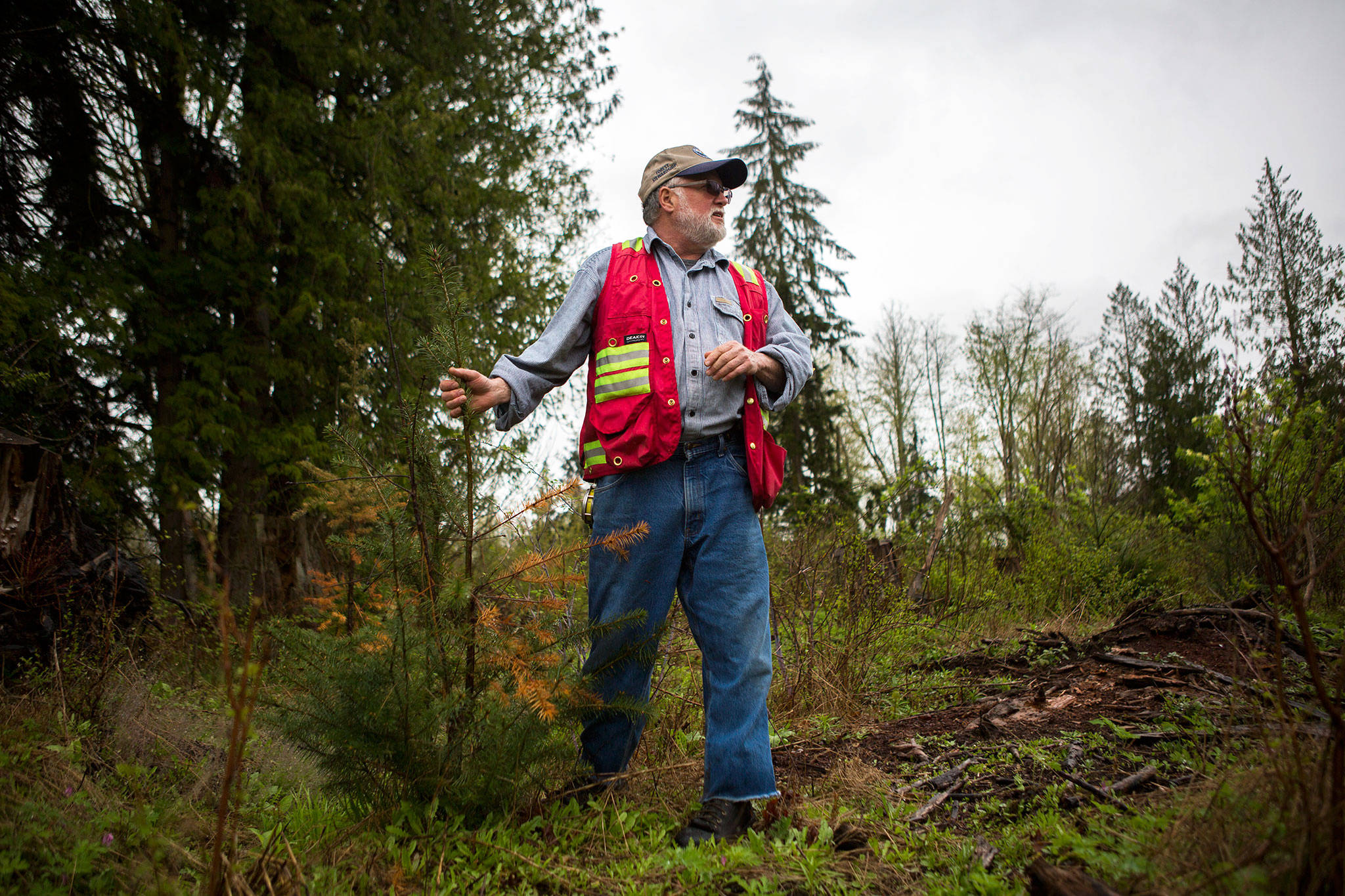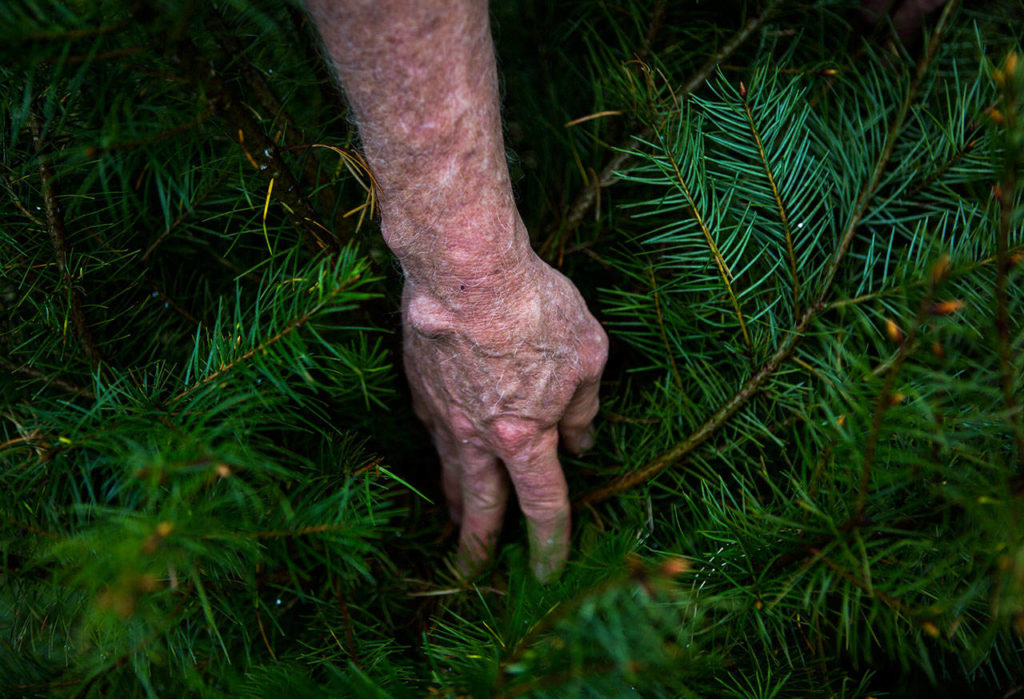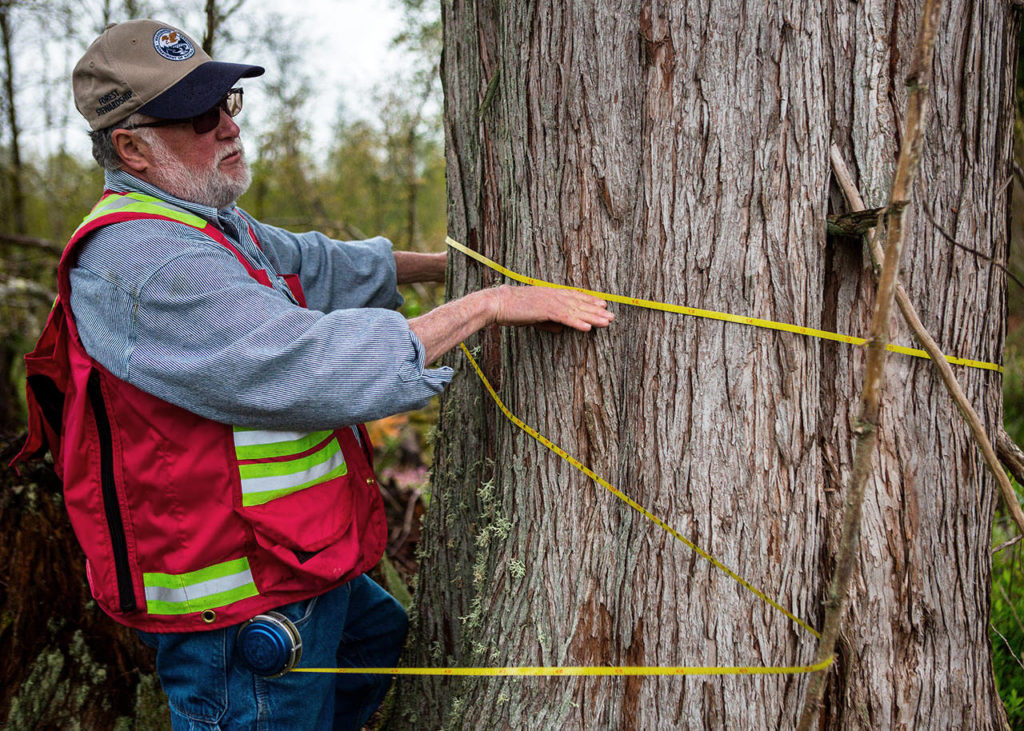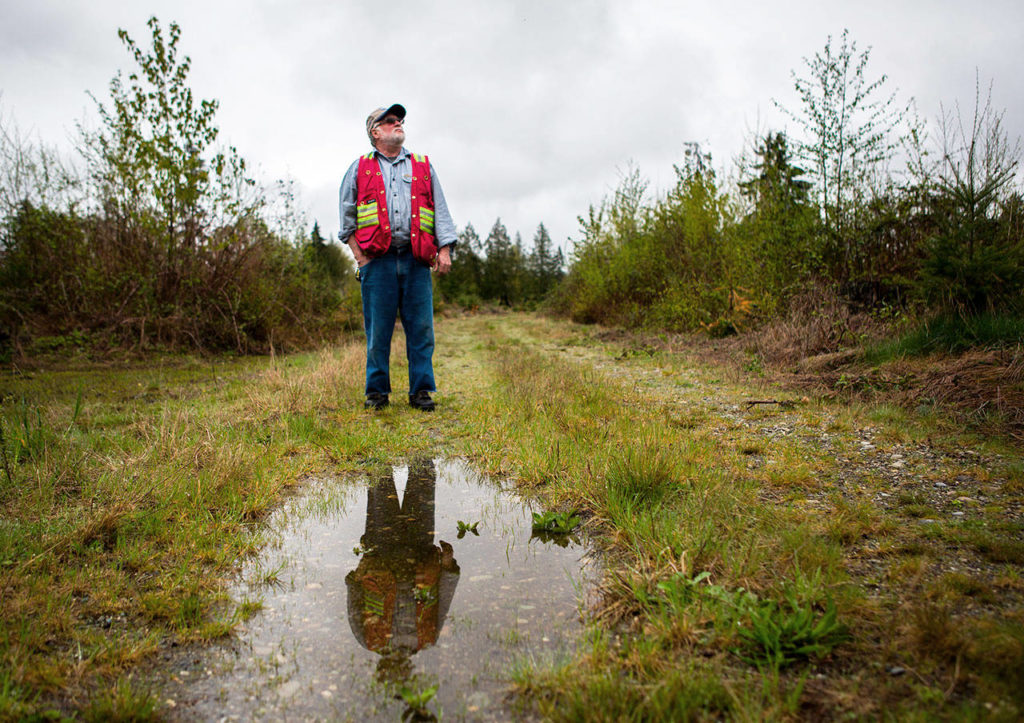ARLINGTON — Boyd Norton has kept the same tried-and-true tools since starting his career as a state forester in the mid-1970s.
Sure, GPS replaced the hand compass. And digital advances rendered the trusty clinometer — a tool for measuring tree heights and slopes — a virtual antique. But Norton kept the old standbys, well, on standby.
“I always carry my compass. I learned that a long time ago,” he said with a chuckle. “I don’t trust electronics. I’m old school.”
Norton, who will soon turn 65, is closing out a career with the Department of Natural Resources. He retired as a DNR forest stewardship and technical assistance forester Tuesday.
Without him, people in northwest Washington have to go further afield for advice on planting trees or maintaining a road through their patch of woods, among other questions.
“He really enjoys working with small-forest landowners,” said Tami Miketa, who manages the DNR’s forest stewardship program and Small Forest Landowner Office. “He’s such a great forester. I get so many compliments from landowners after they’ve worked with him. It’s going to be a big, big loss when he retires.”
The office runs a joint program with the U.S. Forest Service to help private landowners meet their goals, whether aesthetic, environmental or commercial. The benefits are manifold: improving water quality, habitat for fish and wildlife, and forest health. Selectively cutting trees can boost carbon sequestration, by replacing slower-growing mature specimens with younger ones.
Federal grants cover positions for Eastern and Southwest Washington, but not Norton’s corner of the state. His job is going unfilled.
The duties have shifted to a colleague in Olympia, now responsible for the western half of Washington.
“We’ve cobbled funding together to keep our staff going, which isn’t sustainable,” Miketa said. “That’s a real concern that we have.”
That leaves a lot of ground to cover.
More than a third of Washington’s forests are privately owned, half held by families. In Snohomish County, parcels skew to the small side but owners are numerous.
Small landowners have 156,568 acres of Snohomish County forest, according to a University of Washington study. That’s equivalent to a mile-wide swath of woods from Everett to Salem, Oregon. That acreage is divided among nearly 23,000 parcels, and almost as many owners. In western Washington, only Lewis County has more privately owned small forest.
‘People like gnomes’
Norton is bearded, on the short side and spends a lot of time in the woods. He’s also fierce about protecting the environment. Add it all up, and it’s only natural that you’d get some gnome jokes. Norton said he’s been dealing with it for about 35 years.
Ken Bevis, a DNR stewardship biologist, said his colleague is well-loved because he’s funny and “just a nice man.”
“Boyd has a kindly uncle demeanor about him,” Bevis said. “He looks like a gnome. People like gnomes. He has a good way of waiting for the right moment to give the client advice.”
Norton grew up in Puyallup, where his family owned about 7 acres with trees. His dad logged when not making a living on the log boom or as a longshoreman in Tacoma.
“Growing up, I did both of those jobs, too, so it runs in the family,” Norton said.
Logging got his family through the Depression, so Norton figured it would make a good career. He headed to Green River Community College in Auburn to earn an associate degree in forest technology.
When he started at the DNR, jobs weren’t so specialized. He took on almost any task a forester might do: fire warden, road design and monitoring forest health, to name some. He’s worked out of Sedro-Woolley for the past 28 years, five in his current role.
The agency’s approach to forest management has evolved with the science.
When Norton started, the practice was to remove woody debris from streams. Now, they throw it back in for salmon habitat. Stream-side habitat buffers are many times wider than they were.
“When I started, alder was a weed — you killed it,” Norton said.
Now, the fast-growing deciduous tree has value as timber. It’s ideal for some places, given its resistance to conifer-killing diseases and its ability to enrich the soil.
For future generations
When meeting a property owner, Norton would start by discussing what they wanted to accomplish with their forest.
“It’s not the land we find that’s unique — it’s the individuals,” he said.
Mostly, they’re interested in recreation and aesthetics. In a few cases, they want to produce timber. Many don’t know what to do.
That’s where the New family found themselves a few years ago.
Husband David and wife Darlina New wound up with 160 acres north of Arlington that had been in her family since 1942. At one point, the couple had it sold to a developer for houses on 5-acre lots. The economy crashed, and the sale was cancelled. Plans changed.
“This is the typical story of the folks we deal with,” Norton said.
The failed housing development is now Nourse Tree Farm.
Before they replanted part of the property in 2015, the News sought advice from Norton, a private consulting forester and experts at Washington State University Extension. Areas now host alder, Douglas fir, pine and hemlock.
“This looks good,” Norton said during a walk-through on a misty April day. “The site prep worked well. They’ve done all the things we’d recommend.”
A gravel road wound up to a plateau. Where 4-year-old trees weren’t growing, the landscape sprouted with red elderberry, a native species, and Himalayan blackberry, the region’s peskiest invasive.
The trees are part of the family’s investment plan. When the alder is ready for harvest, in 25 years or so, the News’ daughter can put the money toward her retirement. A generation later, the slower-growing Douglas fir could be cut. That’s for their grandsons.
“We had to break up our stand so it could be harvested at different times,” said New, a semi-retired civil engineer and land surveyor who lives in Bellingham.
The Washington Tree Farm Program named the News its Tree Farmer of the Year for 2018.
Norton helped make it happen.
“I don’t want you to go away,” New told him.
Norton won’t go away, really.
He’s kept up his certification as a tree-farm inspector, a gig he’ll continue doing. (In 2017, Norton was named Tree Farm Inspector of the Year, also by the Washington Tree Farm Program.)
In retirement, he plans to fish local rivers, after he fixes up his back yard in Mount Vernon for a granddaughter’s graduation party.
Noah Haglund: 425-339-3465; nhaglund@heraldnet.com. Twitter: @NWhaglund.
Talk to us
> Give us your news tips.
> Send us a letter to the editor.
> More Herald contact information.




























